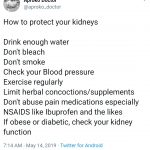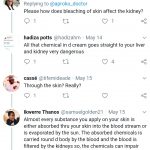Tips on how to protect your kidneys and how to have healthy kidneys.
#No to kidney failure# #Avoid the dialysis room#
How to protect your kidneys
Drink enough water
Don’t bleach
Don’t smoke
Check your Blood pressure
Exercise regularly
Avoid herbal concoctions/supplements
Don’t abuse pain medications especially NSAIDS like Ibuprofen and the likes
If obese or diabetic, check your kidney function
If you are hypertensive, ensure you take your drugs regularly
Ensure you take your drugs if you are diabetic
Limit or avoid taking alcohol
Reduce your salt intake
Do not add salt to already cooked food.
Watch your weight
Ensure you don’t get so thirsty that you feel dehydrated
Know you HIV status
If you are worried for you kidneys, request from your doctor a renal scan and a renal function test.
Don’t sell your kidneys, they one you are banking on may be the bad one.
Go for routine blood sugar test
Ensure routine medical check up
Medical conditions like uurinary tract infections (UTI) must be properly treated.
Excessive consumption of energy drinks will land your kidneys in trouble.
Treat snake and scorpion bites seriously- it can damage the kidneys. Go straight to the hospital.
Symptoms like flank pain, blood in urine, difficulty passing urine, pain on urination, waking up many times to pass urine, smelly urine, pus in urine must be reported to your doctor urgently.
Please do not take drugs unless it was prescribed by your doctors
Eat a balanced diet
Reduce the amount of sugar and fat in your diet
No binge drinking
Be more vigilant if you have a family member with kidney cancer
Don’t get burnt. Practice safe fire practices at home.
Ensure you sleep well
Eat plenty fruits
Avoid or limit excessive consumption of soft drinks
Always void your bladder. Do not hold urine for too long. Urine is a culture media for bacteria.
Do not fight or blow somebody on the flank or loin.
Please do not bleach your children or new born babies. Don’t tone their skin. Please accept the fact that you are black.
Go for routine cancer screening especially prostate cancer.


Read more WebMD




















